Vegetable oils - information about each
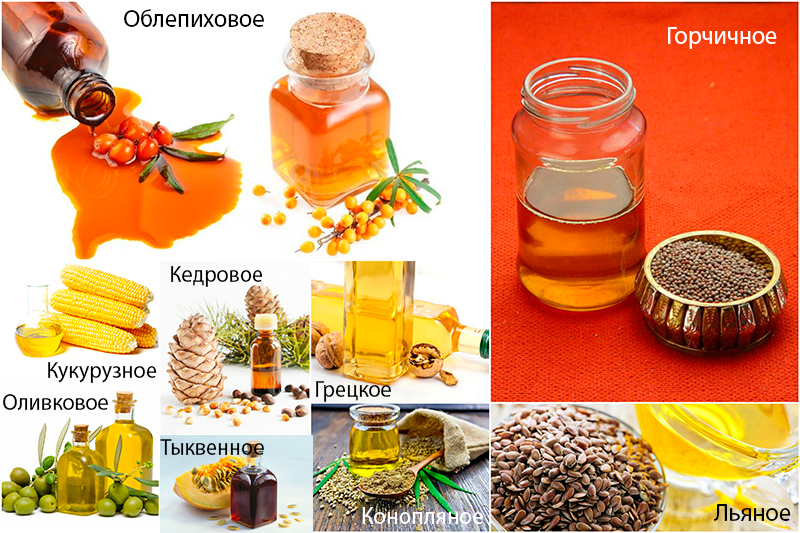
Vegetable oils, vegetable fats - products derived from vegetable raw materials and consisting of triglycerides of fatty acids and related substances (phospholipids, free fatty acids, waxes, sterols, coloring agents, etc.).
Raw materials for the production of vegetable oils are:
- Seeds of oilseeds (sunflower, soybean, rape, cotton, flax, sesame, milk thistle, black cumin, mustard, poppy, hemp);
- Fruits of oil plants (palms, olives);
- Oil-containing waste of processing of plant raw materials (wheat germ, corn, rice, fruit bones of cherries, grapes, apricots, watermelon seeds, melon, tomato, pumpkin, fir, sea-buckthorn seeds);
- Nuts (macadamia, pecans, cedar, Brazilian, Greek, pistachio, coconut, hazelnuts, almonds).
Everybody knows about the benefits of vegetable oils. But not everyone knows about the unique properties of each of them. We will tell you about the beneficial properties of the most common oils, such as Sesame, Linseed, Mustard, Corn, Olive, Pumpkin, Cedar, Peanut, Gretzky oil, Sea-buckthorn, Hemp oil.
Sesame oil
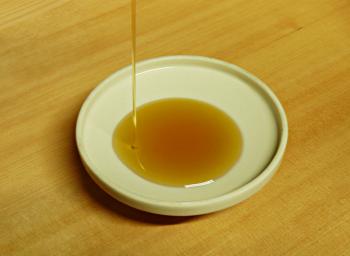
 Sesame (sesame) oil is a vegetable oil obtained from the seeds of the plant Sesamum indicum (sesame, sesame).
Sesame (sesame) oil is a vegetable oil obtained from the seeds of the plant Sesamum indicum (sesame, sesame).
Light in texture and sweet taste of sesame oil is rich in vitamins, zinc and especially calcium. Therefore, it is successfully used for the prevention of osteoporosis and cardiovascular diseases. Sesame oil, also known as "Sesame", was very popular even in ancient times and was always appreciated for its curative, gastronomic and cosmetic properties. In the canons of medical science »Abu-Ali-Ibn Sino (Avicenna) gives about a hundred recipes based on sesame oil. It has also been widely used and is still used by the ancient Indian teaching "Ayurveda", which is respected by modern medicine, in which, one way or another, the methods and formulas of this ancient teaching are applied. Finally, everyone is aware of the widespread use of this oil in folk medicine.
Sesame oil is a valuable food and excellent therapeutic product:
- Effective for various pulmonary diseases, dyspnea, asthma, dry cough;
- Recommended to patients with diabetes mellitus;
- Increases the number of platelets and improves blood coagulability;
- With obesity promotes weight loss and strengthens the body;
- In the treatment of increased acidity of gastric juice;
- Prevents the formation of thrombi, opens blockages;
- Helps with gastrointestinal colic, nephritis and pyelonephritis, kidney stone disease;
- Used for anemia, internal bleeding, hyperfunction of the thyroid gland;
- Is used as an anthelmintic.
Linseed oil
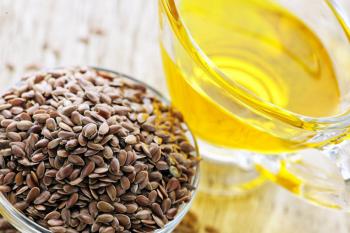
 Flaxseed oil (Latin oleum lini) is a fat vegetable oil obtained from flax seeds.
Flaxseed oil (Latin oleum lini) is a fat vegetable oil obtained from flax seeds.
This vegetable oil is considered to be female, as it helps to produce your own estrogen. It is also a strong antioxidant.
Flaxseed oil was known for its useful properties even in Ancient Rus. It was ingested and used also as an external agent for skin and hair care.
It must necessarily be present in the diet of pregnant women: linseed oil contains the largest amount of unsaturated fatty acids Omega-3 (than in all known fish oil), necessary for the proper development of the child's brain.
It is also well known that the consumption of linseed oil in food reduces the risk of stroke by 40%.
Flaxseed oil also contains a large amount of vitamin E, which is a vitamin of youth and longevity, as well as vitamin F, which prevents the deposition of "bad" cholesterol in the arteries, is responsible for the good condition of hair and skin. Vitamin F helps to reduce weight, by burning saturated fats. Vitamin F in linseed oil easily interacts in conjunction with vitamin E.
Flaxseed oil contains vitamins such as vitamin A, which our body needs to rejuvenate, making it more even, smooth and velvety, and promotes hair growth, as well as B group vitamins that have a beneficial effect on nail growth, skin health And the equilibrium of the nervous system.
If you take in the morning on an empty stomach a tablespoon of linseed oil, then your hair will become more lush and shiny, and the skin color will be more even.
You can also make hair masks from linseed oil. To do this, warm oil on a water bath put on dry hair, cover with a film and warmed towel, leave for about three hours, then wash it off in the usual way. This mask makes the overdried hair less brittle, promotes growth and shine of hair.
When you eat flaxseed oil, you should take into account that this product should be consumed without heat treatment, as when exposed to high temperatures it spoils: an unpleasant smell and a dark color. Therefore, it is best to dress with linseed oil salads or to use it in its pure form.
When buying flaxseed oil, do not forget that you need to store it in the refrigerator, in a dark bottle, and the storage period is limited.
Mustard oil
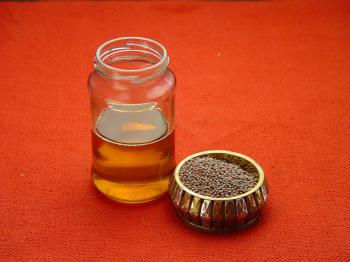
 Mustard oil is an oil made from mustard seeds. For the production of mustard oil, pressing or seed extraction is used.
Mustard oil is an oil made from mustard seeds. For the production of mustard oil, pressing or seed extraction is used.
Mustard oil centuries ago could be eaten only at the royal court, in those days it was called "imperial delicacy." In mustard oil, there are absolutely all fat-soluble vitamins, it has a specific flavor and piquant taste, it is perfect for dressing salads, emphasizes the taste of vegetables. In addition, salads with such dressing last longer keep freshness. Any pastry, in the composition of which this product is present, turns out lush and does not stale for long.
Due to its dietary and gastronomic properties, it considerably exceeds the popular sunflower oil: only one vitamin D "imperial delicacy" contains one and a half times as much. In general, mustard oil is absolutely all fat-soluble vitamins. It contains a lot of vitamin A, which promotes body growth and increases immunity, vitamins K and P, which improve the strength and elasticity of capillaries, a fortifying substance of carotene. In addition, mustard oil contains vitamin B6, which plays an important role in nitrogen metabolism and the processes of synthesis and decomposition of amino acids in the body.
Many nutritionists-naturopaths consider the "imperial delicacy" a ready-made medicine. Due to its antiseptic and bactericidal properties, this vegetable oil is perfectly suitable for the treatment of gastrointestinal, cardiovascular and catarrhal diseases. Some doctors recommend to their patients as a preventive agent to drink every morning on an empty stomach a tablespoon of mustard oil.
Corn oil
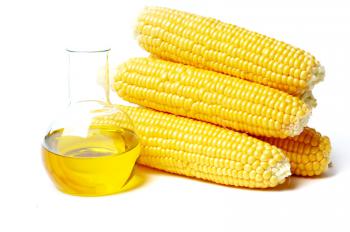
 Corn oil is a fat vegetable oil obtained from corn seeds.
Corn oil is a fat vegetable oil obtained from corn seeds.
The main factors determining the dietary properties of corn oil, we should consider a high content of unsaturated fatty acids (vitamin F) and vitamin E.
A large amount of vitamin E in corn oil helps to strengthen the human immune system. This vitamin is also called a "vitamin of youth", because it is an antioxidant and slows down the aging process in the body, affects the metabolic processes, the level of cholesterol in the blood, improves the functioning of the liver, intestine, gall bladder. Vitamin E in corn oil is indispensable in the treatment of "female" and nervous diseases.
Unsaturated fatty acids, contained in corn oil, increase the body's resistance to infectious diseases and favor the removal of excess cholesterol from the body. Unrefined corn oil has long been used in folk medicine for the treatment of migraine, runny nose and asthma.
Olive oil
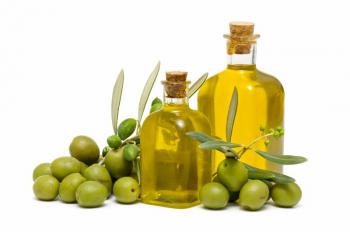
 Olive oil is a vegetable oil derived from European olives (Latin Olea europaea).
Olive oil is a vegetable oil derived from European olives (Latin Olea europaea).
The great Homer called olive oil "liquid gold." Used olive oil since the days of Ancient Egypt. Olive was a symbol of peace and purity, always valued for its many useful properties for health.
Olive oil is considered the most useful of all vegetable oils. It normalizes the pressure, improves the work of the heart and digestive organs. There is evidence that regular use of olive oil several times reduces the risk of breast cancer. When applied externally, it has disinfecting and rejuvenating properties.
The best can be considered extra virgin olive oil (it is labeled as Italian Olio d'oliva l'extravergine or English extra virgin olive oil). In this olive oil, the acidity usually does not exceed 1%, and it is believed that the lower the acidity of the oil, the higher its quality. Even more valuable is olive oil "cold pressing" (English first cold press), although this concept is relatively arbitrary - oil to some extent heated and "cold pressing".
The taste qualities of olive oil deteriorate over time, so it is recommended to consume the entire stock of the product throughout the year.
Olive oil is recommended to store in a dry, cool (but not cold), dark place, away from the various smells of the kitchen, as it easily absorbs them.
Pumpkin Oil
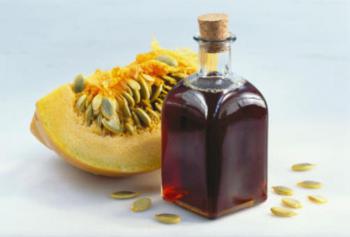
 Pumpkin oil is obtained from pumpkin seeds by cold pressing.
Pumpkin oil is obtained from pumpkin seeds by cold pressing.
The oil contains a large number of biologically active substances: phospholipids, vitamins B1, B2, C, P, flavonoids, unsaturated and polyunsaturated fatty acids - linolenic, oleic, linoleic, palmethic, stearic. It has a tremendous smell, the consistency is slightly more dense than usual.
Pharmacological and clinical studies of scientists have revealed the following actions of pumpkin oil:
- Normalizes the activity of the prostate and prevents the development of adenoma;
- Increases potency;
- It is useful for atherosclerosis and ischemic heart disease;
- Prevents the formation of stones in the gallbladder;
- Protects the liver and improves the functioning of the gastrointestinal tract;
- Lowers cholesterol in the blood;
- Has anti-inflammatory effect;
- Has antiulcer and antiseptic effect;
- Protects against sunburn, accelerates the regeneration of tissues;
- Stimulates the body's immunity;
- Has antifungal, antiparasitic and anthelmintic effect;
- Improves skin condition;
- Helps to restore and accelerate the growth of hair and nails.
For the healing properties of pumpkin oil in people called "Pharmacy in miniature."
Pumpkin oil is used most often as a dressing for salads. It is not recommended to heat it: in this case it loses a significant part of its useful properties. Store the pumpkin oil in a tightly clogged bottle in a cool, dark place.
Cedar oil
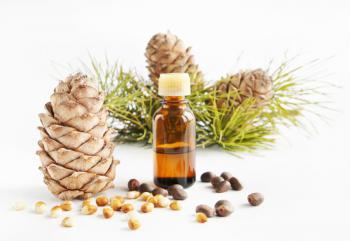
 Cedar fatty oil is a fat vegetable oil obtained by pressing or extraction from "pine nuts" - seeds of Siberian pine. Used as a food product, as part of cosmetics, medicines and dietary supplements.
Cedar fatty oil is a fat vegetable oil obtained by pressing or extraction from "pine nuts" - seeds of Siberian pine. Used as a food product, as part of cosmetics, medicines and dietary supplements.
Oil from Siberian cedar is a natural product, which is a natural concentrate of vitamin E, and contains a large number of polyunsaturated acids, which are not synthesized in the body, but can only come from food.
From folk medicine it is known that cedar oil:
- Has a tonic effect
- Helps to eliminate the syndrome of chronic fatigue
- Increases the mental and physical capabilities of the human body
- Restores the strength of the body
- Increases the potency in men
Oil of Siberian cedar in the old days was called a remedy for 100 diseases. Its healing properties are recognized not only folk, but also official medicine. The results of the conducted tests indicate the high efficiency of cedar oil in complex therapy in the treatment of the following diseases:
- Pancreatitis, cholestitis;
- Varicose veins, trophic ulcers;
- Peptic ulcer of the duodenum and stomach;
- Superficial gastritis;
- Prevents hair loss, brittle hair, nails;
- Improves blood composition, promotes hemoglobin increase;
- Regulates lipid metabolism, i.e. Lowers the level of cholesterol in the blood
- Effective for various skin diseases, burns and frostbite.
Cedar oil has always been considered a delicacy. It is easily absorbed by the body, has high nutritional and healing properties, is unusually rich in vitamins and microelements. Cedar nut oil contains a wide range of substances useful for the human body: polyunsaturated fatty acids, proteins, vitamins A, B, E, D, F, 14 amino acids, 19 microelements.
Cedar oil is recommended to be added to salads to give a refined taste.
Using the Siberian Cedar Oil for massage in a bath or sauna gives the effect of skin rejuvenation, makes it supple and elastic, and also provides prevention of skin diseases.
Peanut butter
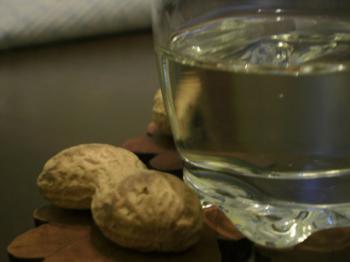
 Peanut butter is unrefined oil obtained by cold pressing the pulp of peanut fruit.
Peanut butter is unrefined oil obtained by cold pressing the pulp of peanut fruit.
Peanut butter is widely used for frying, deep-frying, dressing salads, for making sauces, for all kinds of cold dishes, in dishes from dough, in Asian cuisine.
Peanut butter is widely used in medicine:
- In the treatment of purulent and poorly healed wounds, he has no equal;
- Increases potency and libido;
- Improves memory, attention and hearing;
- Lowers cholesterol in the blood;
- Has a curative effect in diseases of the cardiovascular system and violations of hematopoietic functions;
- Normalizes the work of the kidneys and gallbladder, one of the best cholagogues;
- Prevents the formation of blood clots;
- Has a calming effect on the nervous system;
- It is recommended for people suffering from overweight, gastrointestinal problems, liver and kidney diseases.
Peanut butter is absolutely devoid of cholesterol.
Oil of a walnut
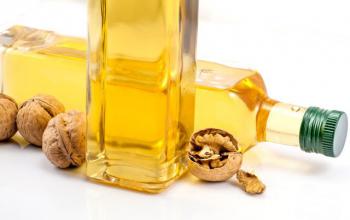
 Walnut oil (German Walnussol, french huile de noix, English walnut oil) is a fatty oil derived from walnut fruit (Latin Juglans regia).
Walnut oil (German Walnussol, french huile de noix, English walnut oil) is a fatty oil derived from walnut fruit (Latin Juglans regia).
Oil of a walnut is a highly nutritious product with valuable flavoring qualities:
- It is an excellent nutritious product in the period of recovery from the transferred diseases and operations;
- Promotes the healing of wounds, cracks, long-lasting non-healing ulcers;
- Effective in the treatment of psoriasis, eczema, furunculosis, varicose veins;
- An excellent tool for weight loss and rejuvenation of the body;
- Reduces the production of cholesterol, strengthens the vascular wall;
- Reduces the risk of cardiac diseases;
- Facilitates the removal of radionuclides from the body;
- The record content of vitamin E - strongly tones up and increases the body's defense;
- An excellent tool for losing weight.
Sea buckthorn oil
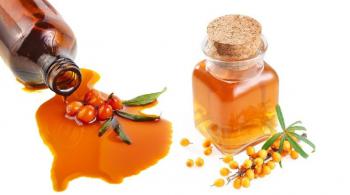
 Sea-buckthorn oil is obtained by extraction of sea-buckthorn seeds on sunflower oil. Oily, orange-red liquid with a characteristic smell and taste. The acid number is not more than 14.5. Contains a mixture of carotene and carotenoids of not less than 180 mg%, the amount of tocopherols, sterols, phospholipids, vitamin K, as well as glycerides of oleic, linoleic, palmitoleic, palmitic and stearic acids.
Sea-buckthorn oil is obtained by extraction of sea-buckthorn seeds on sunflower oil. Oily, orange-red liquid with a characteristic smell and taste. The acid number is not more than 14.5. Contains a mixture of carotene and carotenoids of not less than 180 mg%, the amount of tocopherols, sterols, phospholipids, vitamin K, as well as glycerides of oleic, linoleic, palmitoleic, palmitic and stearic acids.
It is a unique healing oil known in ancient times.
Sea buckthorn oil has gained its fame thanks to its unusual healing properties. Unique properties of this oil are widely used, both in folk and traditional medicine for the treatment and prevention of a number of diseases.
This oil has a natural taste and aroma. For prevention, it is recommended to add it to salads in combination with other vegetable oils. Also, sea buckthorn oil can be used for cooking any dishes, giving them an unusual taste and increasing their nutritional value.
Little sea buckthorn is a product with a high content of carotenoids, vitamins: E, F, A, K, D and biologically active substances. Used as a source of beta-carotene.
Sea-buckthorn oil perfectly proved itself in the treatment:
- Inflammations of the mucosa of the digestive tract (used in the complex therapy of peptic ulcer of the stomach and duodenum)
- Gynecological diseases: cervical erosion, colpitis, vaginitis, endocervicitis.
- Burns, radiation and ulcerative skin lesions, decubitus, stomach ulcers, radiation cancer of the esophagus.
- Chronic diseases of the upper respiratory tract: pharyngitis, laryngitis, sinusitis.
- Ulcers of the cornea of the eye.
- Pathological processes of the rectum.
- Inflammatory diseases of gums and paradontosis.
- Atherosclerosis.
- Scaly and pityrious lichen and neurodermatitis.
- For rapid healing of wounds, abrasions and other skin lesions. At the same time, a characteristic feature of sea buckthorn oil is the high quality of healing - the absence of any scars and scars on the site of the lesion.
- To restore the skin after sun and radiation burns, to accelerate the formation of tissues.
- Against wrinkles, with freckles and pigmented spots, with acne, dermatitis and skin cracks.
- Improves eyesight.
- Prevents the formation of blood clots.
Hemp oil
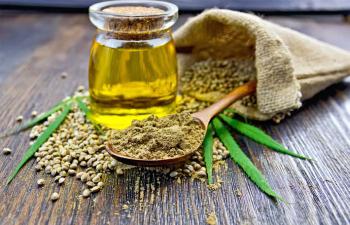
 Hemp oil is a fat vegetable oil obtained from the fruits of a cannabis plant (Cannabis sativa), by the first cold pressing.
Hemp oil is a fat vegetable oil obtained from the fruits of a cannabis plant (Cannabis sativa), by the first cold pressing.
From time immemorial hemp seed was used as a nutritious and healthy food (in the Slavic tradition - hemp cakes). Also, the ancient Slavic peoples made and used to eat tasty and very popular at the time hemp oil, which has many, almost forgotten today, very useful properties. This oil is an excellent alternative to olive, nut and butter.
It is used as a high-quality oil for dressing salads and other cold vegetable dishes, it is successfully used for grilling, when frying in a pan, in marinades and sauces. The chemical composition of hemp oil is closest to linseed oil, but unlike it, this delicious oil has a delicate nutty spicy taste. Hemp oil, along with linseed oil, green leafy vegetables and fish oil, is one of the few food products containing the inactive form of polyunsaturated fatty acid, OMEGA-3, which our body needs.
Via vk.com & wiki


Comments
Commenting on, remember that the content and tone of your message can hurt the feelings of real people, show respect and tolerance to your interlocutors even if you do not share their opinion, your behavior in the conditions of freedom of expression and anonymity provided by the Internet, changes Not only virtual, but also the real world. All comments are hidden from the index, spam is controlled.